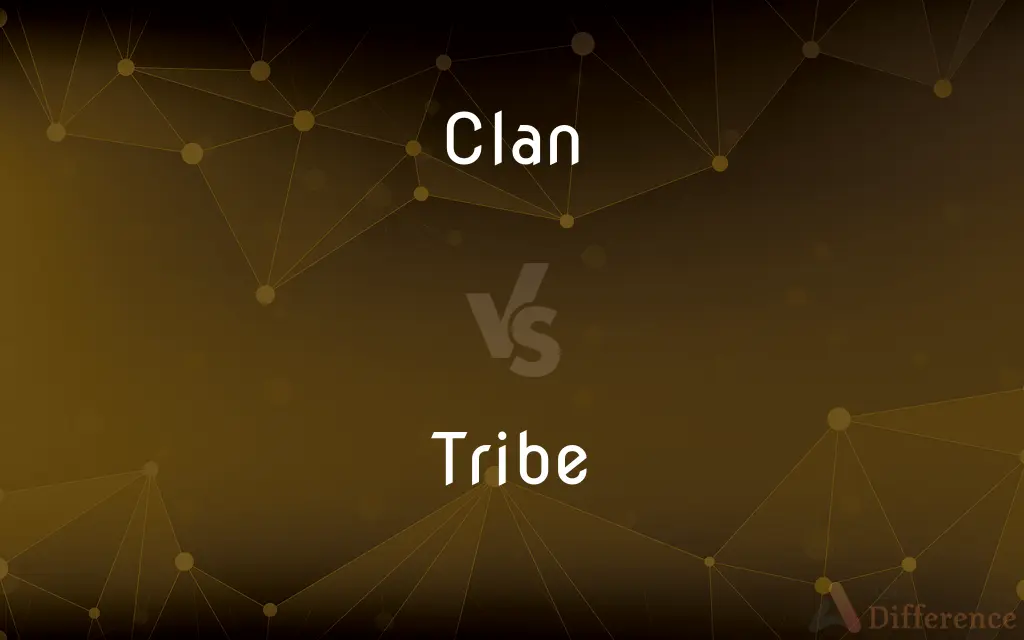Clan vs. Tribe — What's the Difference?
Edited by Tayyaba Rehman — By Fiza Rafique — Updated on September 26, 2023
Clan is close-knit social group typically consisting of families with a common ancestor, often associated with Scottish or Celtic culture. Tribe is larger social unit comprising multiple clans or extended families, often sharing a common culture, language

Difference Between Clan and Tribe
Table of Contents
ADVERTISEMENT
Key Differences
Clan: Smaller and more intimate social group, often based on familial ties. Tribe: Larger, encompassing multiple clans or extended families.
Clan: May inhabit a specific region or village. Tribe: Often associated with a larger territory or geographic area.
Clan: Focused on the cohesion of a single family lineage. Tribe: Characterized by a broader sense of identity, encompassing multiple lineages.
Compare with Definitions
Clan
A group bound by kinship and often living in proximity.
The Highland clan settled in the remote valleys.
Tribe
A community sharing common culture and traditions.
The Maasai tribe is known for its unique customs.
ADVERTISEMENT
Clan
A lineage with its own customs and rituals.
The O'Brien clan traced its roots to Ireland.
Tribe
A group with a collective identity and territory.
The Amazon rainforest is home to various indigenous tribes.
Clan
A close-knit group of families sharing a common ancestor.
The MacGregor clan gathered for a traditional ceremony.
Tribe
A society with its own language and leadership.
The Bedouin tribe roamed the desert for generations.
Clan
An extended family group with shared traditions.
Clan members celebrated their heritage with clan tartans.
Tribe
The term tribe is used in many different contexts to refer to a category of human social group. The predominant usage of the term is in the discipline of anthropology.
Clan
A clan is a group of people united by actual or perceived kinship and descent. Even if lineage details are unknown, clan members may be organized around a founding member or apical ancestor.
Tribe
A unit of sociopolitical organization consisting of a number of families, clans, or other groups who share a common ancestry and culture and among whom leadership is typically neither formalized nor permanent.
Clan
A close-knit group of interrelated families, especially in the Scottish Highlands
The clan Macleod
Civil strife has followed as rival clans jockey for power
Tribe
Any of the three divisions of the ancient Romans, namely, the Latin, Sabine, and Etruscan.
Clan
A traditional social unit in the Scottish Highlands, consisting of a number of families claiming a common ancestor and following the same hereditary chieftain.
Tribe
Any of the 12 divisions of ancient Israel.
Clan
A division of a tribe tracing descent from a common ancestor.
Tribe
A phyle of ancient Greece.
Clan
A large group of relatives, friends, or associates.
Tribe
A group of people sharing an occupation, interest, or habit
A tribe of graduate students.
Clan
(anthropology) A group of people all descended from a common ancestor, in fact or belief, especially when the exact genealogies are not known.
Descent group
Tribe
(Informal) A large family.
Clan
A traditional social group of families in the Scottish Highlands having a common hereditary chieftain
Tribe
(Biology) A taxonomic category ranking below a family or subfamily and above a genus and usually containing several genera.
Clan
Any group defined by family ties with some sort of political unity.
Tribe
An ethnic group larger than a band or clan (and which may contain clans) but smaller than a nation (and which in turn may be contained within a nation). The tribe is often the basis of ethnic identity.
Clan
(video games) A group of players who habitually play on the same team in multiplayer games.
Tribe
(synecdoche) A tribal nation or people.
Clan
A badger colony.
Tribe
(pejorative) A nation or people in an area considered culturally primitive, such as Africa, Australia or Native America.
Clan
A tribe or collection of families, united under a chieftain, regarded as having the same common ancestor, and bearing the same surname; as, the clan of Macdonald.
Tribe
A socially cohesive group of people within a society
Clan
A clique; a sect, society, or body of persons; esp., a body of persons united by some common interest or pursuit; - sometimes used contemptuously.
Partidge and the rest of his clan may hoot me.
The whole clan of the enlightened among us.
Tribe
(zoology) A group of apes who live and work together.
Clan
Group of people related by blood or marriage
Tribe
(taxonomy) A hierarchal rank between family and genus.
Clan
A social unit with a strong sense of familial identity.
The clan's traditions were passed down through generations.
Tribe
The collective noun for various animals.
Tribe
(stock breeding) A family of animals descended from some particular female progenitor, through the female line.
The Duchess tribe of shorthorns
Tribe
(transitive) To distribute into tribes or classes; to categorize.
Tribe
A family, race, or series of generations, descending from the same progenitor, and kept distinct, as in the case of the twelve tribes of Israel, descended from the twelve sons of Jacob.
A wealthy Hebrew of my tribe.
Tribe
A number of species or genera having certain structural characteristics in common; as, a tribe of plants; a tribe of animals.
Tribe
A nation of savages or uncivilized people; a body of rude people united under one leader or government; as, the tribes of the Six Nations; the Seneca tribe.
Tribe
A division, class, or distinct portion of a people, from whatever cause that distinction may have originated; as, the city of Athens was divided into ten tribes.
Tribe
A family of animals descended from some particular female progenitor, through the female line; as, the Duchess tribe of shorthorns.
Tribe
To distribute into tribes or classes.
Our fowl, fish, and quadruped are well tribed.
Tribe
A social division of (usually preliterate) people
Tribe
A federation (as of American Indians)
Tribe
(biology) a taxonomic category between a genus and a subfamily
Tribe
Group of people related by blood or marriage
Tribe
A larger social unit comprising multiple clans or families.
The Native American tribe had several distinct clans.
Tribe
An organized social unit with shared values.
The Ashanti tribe has a rich history of craftsmanship.
Common Curiosities
How is clan leadership determined?
Clan leadership may be based on seniority, lineage, or the consensus of clan members.
What is a clan?
A clan is a tight-knit social group comprising families with a common ancestor and shared traditions.
What is the significance of clans in Scottish culture?
Clans are integral to Scottish heritage, with each clan having its tartan, history, and cultural practices.
What are some common clan traditions?
Clan traditions may include specific tartans, crests, and ceremonies that celebrate their heritage.
Are tribes only found in indigenous cultures?
While commonly associated with indigenous societies, tribes can exist in various cultural contexts.
Can clans exist outside of Scottish culture?
Yes, clans can be found in various cultures worldwide, each with its own unique characteristics.
What defines a tribe?
A tribe is a larger social unit comprising multiple clans or extended families, often sharing a common culture, language, or territory.
What distinguishes a tribe from a clan?
Tribes are larger and encompass multiple clans, often with a more complex social structure.
How do tribes maintain cultural identity?
Tribes often preserve their identity through shared languages, customs, and oral traditions.
Is tribal leadership uniform across all tribes?
Tribal leadership structures can vary widely, with chiefs, councils, or elders depending on the tribe's traditions.
Share Your Discovery

Previous Comparison
Which vs. What
Next Comparison
Globalization vs. InternationalizationAuthor Spotlight
Written by
Fiza RafiqueFiza Rafique is a skilled content writer at AskDifference.com, where she meticulously refines and enhances written pieces. Drawing from her vast editorial expertise, Fiza ensures clarity, accuracy, and precision in every article. Passionate about language, she continually seeks to elevate the quality of content for readers worldwide.
Edited by
Tayyaba RehmanTayyaba Rehman is a distinguished writer, currently serving as a primary contributor to askdifference.com. As a researcher in semantics and etymology, Tayyaba's passion for the complexity of languages and their distinctions has found a perfect home on the platform. Tayyaba delves into the intricacies of language, distinguishing between commonly confused words and phrases, thereby providing clarity for readers worldwide.
















































